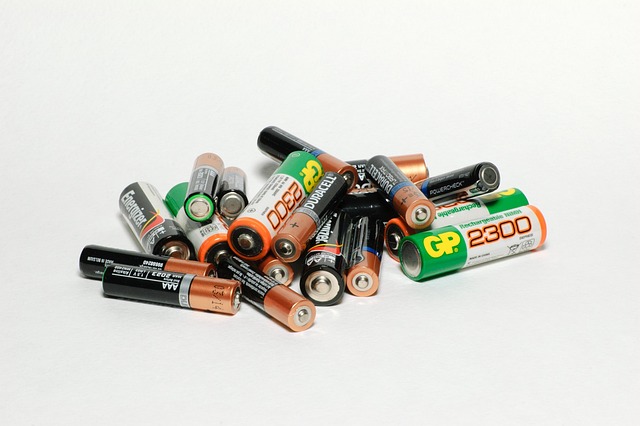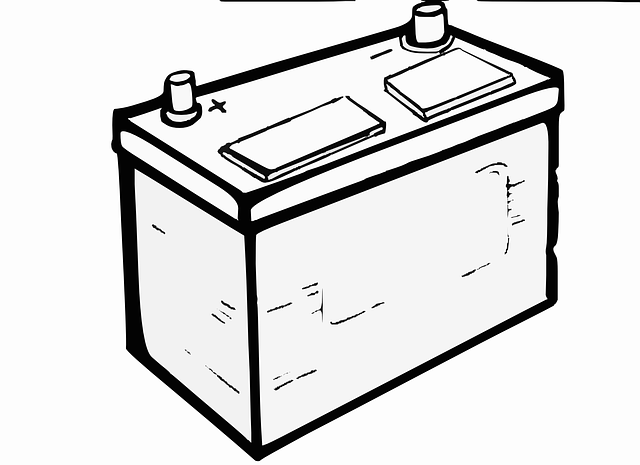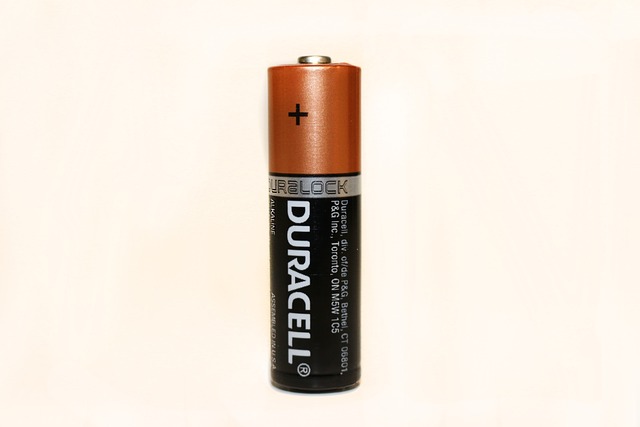Maximizing Maritime Safety and Convenience with Auxiliary Batteries
Auxiliary batteries are a critical upgrade for modern maritime vessels, enhancing both safety and convenience. They provide an additional power source that can sustain essential onboard electronics and systems like navigation lights, GPS, VHF radios, and safety equipment during long voyages or when…….

Auxiliary batteries are a critical upgrade for modern maritime vessels, enhancing both safety and convenience. They provide an additional power source that can sustain essential onboard electronics and systems like navigation lights, GPS, VHF radios, and safety equipment during long voyages or when the primary battery is depleted. These robust deep-cycle batteries are specifically designed to withstand the harsh marine environment, offering a longer service life and greater efficiency compared to traditional lead-acid batteries. By choosing a high-capacity auxiliary battery that matches your vessel's power needs, you can enjoy extended use of amenities without overloading the main electrical system. The right auxiliary battery should be durable, have an optimal ampere-hour rating, fit within your boat's space and weight constraints, and be compatible with your charging system for efficient recharging cycles. Investing in a quality auxiliary battery can significantly enhance your boating experience while providing cost savings and peace of mind over time.
Exploring the benefits of auxiliary batteries in marine settings reveals their significant role in enhancing safety, durability, and functionality for a variety of maritime applications. This article delves into the robust performance of these power solutions in saltwater environments, their pivotal function in aiding navigation and manoeuvring, and their status as a reliable source for powering critical marine electronics. Additionally, we will examine the long-term advantages for recreational users, the impact on safety at sea, and how auxiliary batteries present cost-effective solutions for vessel owners. A comprehensive buying guide assists in selecting the ideal auxiliary battery to meet your specific maritime needs. Join us as we power through the essentials of auxiliary battery systems in marine use.
- Understanding Auxiliary Batteries in Maritime Applications
- Enhanced Durability and Performance of Auxiliary Batteries in Saltwater Environments
- The Role of Auxiliary Batteries in Navigating and Manoeuvring Challenges
- Auxiliary Battery Systems: A Reliable Power Source for Marine Electronics
- Long-Term Benefits of Auxiliary Batteries for Recreational Marine Activities
- Auxiliary Batteries and Their Impact on Safety at Sea
- Cost-Effective Solutions with Auxiliary Batteries for Vessel Owners
- Selecting the Right Auxiliary Battery for Your Marine Needs: A Buying Guide
Understanding Auxiliary Batteries in Maritime Applications

Auxiliary batteries play a pivotal role in maritime applications, serving as a dependable power source for a myriad of onboard systems and equipment. Unlike the main engine-starting battery that is critical for ignition and electrical starting functions, auxiliary batteries are designed to provide consistent, stable power for extended periods. These batteries are typically deep-cycle types, built to withstand the frequent discharging and recharging cycles associated with marine use. They are integral for running onboard appliances like refrigerators, lighting, entertainment systems, and navigation equipment, especially during anchoring or when the primary engine is not in operation.
In a maritime context, auxiliary batteries are often the linchpin in power management strategies. They store energy generated by the vessel’s alternator, wind turbines, or solar panels, ensuring that there is a reliable source of power available at all times. This redundancy is crucial for safety and convenience, as it can support critical operations even when the main battery is depleted. Additionally, with advancements in battery technology, such as lithium-ion auxiliary batteries, mariners have access to lighter, more compact, and longer-lasting power solutions that can enhance the overall performance and efficiency of their vessels. Understanding the capabilities and proper maintenance of these batteries is essential for anyone operating a marine craft, as it directly impacts both the safety and the quality of the experience on board.
Enhanced Durability and Performance of Auxiliary Batteries in Saltwater Environments

Auxiliary batteries play a pivotal role in enhancing the durability and performance of marine vessels, particularly when operating in saltwater environments. These specialized batteries are designed to withstand the corrosive effects of saltwater and humidity, which can rapidly degrade traditional lead-acid batteries. The construction materials used in auxiliary batteries, such as heavy-duty rubber and coatings that resist electrolyte leakage, ensure their longevity and reliability even when exposed to harsh marine conditions. This resilience translates into consistent power delivery for onboard systems like navigation lights, fish finders, and entertainment systems, ensuring uninterrupted functionality regardless of the vessel’s duration at sea. Additionally, advancements in auxiliary battery technology have led to improved energy density and efficiency, allowing for longer run times and the ability to store more power over an extended period without significant self-discharge rates. As a result, mariners can rely on these batteries for critical operations during long voyages or when anchored offshore, making them an indispensable component for modern marine applications.
The Role of Auxiliary Batteries in Navigating and Manoeuvring Challenges

Auxiliary batteries play a pivotal role in enhancing the navigational capabilities and manoeuvring efficiency of marine vessels. These deep-cycle batteries are designed to handle the frequent discharge and recharge cycles associated with maritime activities, making them an indispensable component for modern seafaring endeavours. When primary power sources, such as a ship’s main engine battery, are insufficient or unavailable, auxiliary batteries step in to ensure that navigation equipment, lighting, and communication systems continue to operate reliably. This is particularly crucial during night-time operations or in situations where the vessel must conserve its main battery for essential functions.
Moreover, auxiliary batteries are instrumental in managing the challenges of complex manoeuvres, such as docking or operating in narrow waterways. They provide the necessary power to run electric motors, bow thrusters, and other electrical systems that assist in precise positioning and directional control without overtaxing the main battery. Their ability to store energy from alternative sources like solar panels or wind turbines further enhances a vessel’s sustainability and operational flexibility, allowing for longer excursions and reduced reliance on fossil fuels. Incorporating robust auxiliary batteries into maritime vessels not only supports safer navigation practices but also aligns with the growing emphasis on eco-friendly boating solutions.
Auxiliary Battery Systems: A Reliable Power Source for Marine Electronics

Auxiliary battery systems play a pivotal role in marine environments, serving as a dependable power source for an array of critical electronics on board vessels. The reliability of these systems is paramount when one considers the remote locations often frequented by mariners, where main engine-derived electricity might not be readily available or could be unreliable. Auxiliary batteries are specifically designed to handle the rigorous demands of marine electronics, from GPS units and fish finders to sophisticated navigation systems and autopilots. Their ability to provide consistent power without draining the ship’s primary electrical system is a significant advantage, ensuring that these essential devices operate efficiently throughout the journey. Moreover, with advancements in battery technology, auxiliary batteries are now more robust, longer-lasting, and have a higher capacity than ever before. This means mariners can enjoy extended use of their electronic equipment without compromising on performance or safety, making auxiliary battery systems an indispensable component for modern seafaring endeavors.
Long-Term Benefits of Auxiliary Batteries for Recreational Marine Activities

Auxiliary batteries play a pivotal role in enhancing the recreational marine experience, offering a host of long-term benefits that extend beyond the immediate power needs. These deep-cycle batteries are designed to provide sustained energy over long periods, which is crucial for offshore excursions where primary navigation and safety systems rely on consistent electrical supply. The longevity of auxiliary batteries means that boat owners can enjoy longer trips without the fear of power depletion. Additionally, these batteries often come with a higher capacity than typical starter batteries, allowing for the operation of various onboard appliances like refrigeration units, entertainment systems, and lighting. This increased capacity not only improves the overall comfort but also safety, as it ensures that essential navigation equipment, such as GPS and VHF radios, remain operational even during extended stays at sea.
Moreover, the robust construction of auxiliary batteries is tailored to withstand the harsh marine environment. They are resistant to corrosion from saltwater and can operate in a wide range of temperatures, ensuring their reliability throughout the year. The ability to maintain a charge over long periods and handle multiple discharge/recharge cycles without significant degradation in performance means that boat owners can plan longer voyages with greater confidence. The reduced need for frequent maintenance and the potential to extend the lifespan of these batteries through proper care further solidify their value as an investment for any recreational marine enthusiast. By integrating an auxiliary battery system, mariners can significantly enhance their onboard experience, making their time on the water more enjoyable and safer.
Auxiliary Batteries and Their Impact on Safety at Sea

Auxiliary batteries play a pivotal role in enhancing safety at sea by providing reliable power sources beyond what is supplied by the vessel’s primary starter battery. These deep-cycle batteries are designed to deliver consistent energy for an extended period, which is crucial when operating navigation lights during nighttime or in low visibility conditions, ensuring that the vessel remains compliant with maritime regulations and enhances its visibility to other ships and marine traffic. Additionally, auxiliary batteries support onboard systems such as fish finders, GPS, VHF radios, and other electronic devices, which are indispensable for navigation, fishing, and communication in emergency situations. The redundancy offered by auxiliary batteries means that if the main battery fails, critical safety equipment can continue to operate, thereby minimizing the risk of distress at sea. Properly maintained auxiliary batteries not only extend the operational capabilities of a vessel but also provide peace of mind to both the crew and passengers by safeguarding against power outages in critical moments. The strategic placement and regular inspection of these batteries further contribute to their reliability, making them an essential component for safety and efficiency on modern seafaring vessels.
Cost-Effective Solutions with Auxiliary Batteries for Vessel Owners

The integration of auxiliary batteries in marine vessels offers a multitude of benefits, particularly in terms of cost-effectiveness for vessel owners. These power sources provide an additional layer of redundancy that can be crucial during extended voyages or when operating in remote areas where access to conventional power sources is limited. Auxiliary batteries are designed to handle the deep discharge cycles typical in marine applications, ensuring reliable performance over time. This resilience translates into significant savings, as it minimizes the need for frequent replacements or costly maintenance associated with traditional lead-acid batteries. Moreover, the advanced technology behind modern auxiliary batteries, such as lithium-ion and AGM (Absorbent Glass Mat) options, allows for a longer service life and greater efficiency. This means vessel owners can enjoy prolonged power availability without the frequent financial outlay required by older battery technologies. The cost savings extend beyond the initial purchase; the lighter weight and compact size of these batteries contribute to better fuel economy, as they reduce the overall load on the vessel, further enhancing the economic value for the owner. Investing in an auxiliary battery system is not just a prudent choice for uninterrupted power supply on board but also a smart financial decision that pays dividends over time.
Selecting the Right Auxiliary Battery for Your Marine Needs: A Buying Guide

When selecting an auxiliary battery for marine use, it’s crucial to consider several factors to ensure optimal performance and reliability on the water. The marine environment is harsh, with saltwater corrosion and vibrations from waves posing significant challenges. Therefore, a battery designed specifically for such conditions, like those labeled “marine” or “deep-cycle,” should be your primary choice. These batteries are built to withstand the rigors of frequent discharges and recharges that come with marine applications. Additionally, their construction includes materials resistant to corrosion from saltwater, extending their lifespan.
Capacity is another key consideration. A battery’s capacity, measured in ampere-hours (Ah), determines how much power it can deliver over time. For marine use, a higher capacity often means more autonomy for your onboard electronics and appliances. It’s also important to match the battery’s capacity with the power requirements of your boat’s electrical system. Consider the number of devices you plan to use simultaneously, such as trolling motors, fish finders, or navigation lights, and choose an auxiliary battery that can comfortably support their demand. Size and weight are additional factors, particularly if space and payload are limited on your vessel. Lastly, ensure compatibility with your boat’s charging system; the battery should be able to accept and store energy efficiently from your boat’s alternator or solar panels. By carefully considering these aspects, you can select an auxiliary battery that will reliably power your marine adventures and provide peace of mind underway.
When exploring the myriad benefits of auxiliary batteries for marine use, it becomes evident that these power solutions offer significant advantages for mariners. From their resilience against saltwater corrosion to their reliable support for critical onboard electronics and systems, auxiliary batteries are indispensable for both recreational and commercial marine activities. Their role in enhancing safety at sea, particularly during nighttime navigation or adverse weather conditions, cannot be overstated. Moreover, the cost-effectiveness of investing in a quality auxiliary battery system makes them an economical choice for vessel owners looking to improve their maritime experience. This article has outlined the key considerations for selecting the appropriate auxiliary battery, ensuring that users can make informed decisions to meet their specific marine needs. Ultimately, the integration of auxiliary batteries in maritime applications is a testament to the ongoing evolution of technology in service of safer and more efficient sailing experiences.







